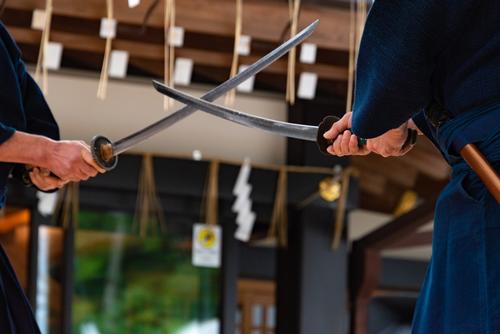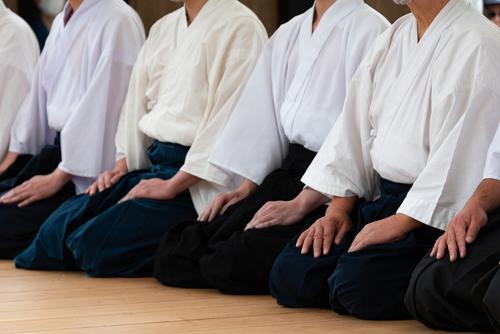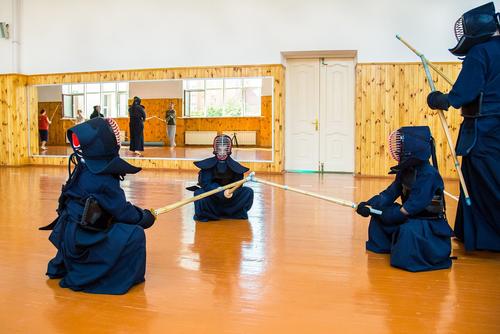Etiquette is an essential part of smooth human relationships. Martial arts such as kendo and judo place the utmost importance on etiquette. Many parents have their children learn martial arts in order to instill in them etiquette, such as the idea that "it begins and ends with courtesy."
Here we will explain why etiquette is important in martial arts.
Martial arts are about building character

Martial arts evolved from traditional Japanese martial arts, and their purpose is to develop character through training and practice. Therefore, in addition to physical training and the acquisition of skills, they also place great importance on etiquette and formality. In other words, by learning martial arts, you can also acquire proper etiquette.
The origins of martial arts
The word "budo" has been used since before the Edo period, meaning "bushido" or "the way of life of a samurai." It wasn't until the latter half of the Taisho period that the word "budo" was established as a general term for kendo, judo, and other disciplines, as it is today. Before the Meiji Restoration, kendo was called swordsmanship and judo was called jujutsu, and each had its own school and were collectively referred to as "martial arts."
In 1899, when Nitobe Inazo's "Bushido" was published in English, it became a worldwide bestseller, sparking a bushido boom. This was also an era of rising militarism following Japan's victory in the Russo-Japanese War, and martial arts became popular as competitive sports.
Later, there was a growing movement to make martial arts a compulsory subject in school education. At that time, the morality of bushido was emphasized and was added as an ideal, and thus modern martial arts were created.
In martial arts, there is also an aspect that values posture and form.
The original purpose of martial arts is character development. For this reason, in addition to physical training and the acquisition of competitive skills, martial arts also tend to emphasize manners and forms, like in the tea ceremony and Japanese dance. The phrase "Begin with courtesy and end with courtesy," often used in martial arts, truly expresses an attitude of mutual respect and reverence.
In the midst of our busy daily lives, it is easy to overlook greetings, but in martial arts, it is important to begin with a bow to any opponent, and to remain calm until the end, no matter how the match unfolds or the outcome, and to end with a bow.
Why is etiquette important in martial arts?

One reason why courtesy is necessary in martial arts is that showing respect for your opponent allows you to control yourself. Martial arts such as kendo, judo, and karate involve one-on-one combat. Inexperienced techniques and an immature mind can lead to injury or trouble. In order to avoid these, it is necessary to be polite and control your techniques and mind.
Respect your opponent and avoid injuries
In sports like kendo, the act of striking with a bamboo sword is itself a very violent act. During the exchange of strikes, it is possible to accidentally strike a place where you shouldn't, or miss the target due to inexperienced technique. If you are struck in an area where there is no protective gear, the other person may be injured. Even if that is not the case, hitting someone on the head is extremely rude.
Bowing before a match allows you to apologize in advance for such rudeness, and by facing the situation with humility, you can control yourself and prevent injuries and trouble from occurring.
Controlling emotions and the fighting instinct
Although courtesy is a formality, forcing oneself into this form allows one to regain the rationality that can easily be lost. A match is, after all, a competition, not a fight to the death. However, as the match reaches its climax and the movements become more active, it becomes difficult to suppress emotions and the fighting instinct.
However, in martial arts, courtesy is emphasized in everyday practice, so the discipline of "beginning and ending with a bow" is never wavered. Therefore, no matter how the match unfolds, you will be able to control your emotions and fighting instincts.
Martial arts etiquette is necessary in education as well

Etiquette is not limited to martial arts, but is also essential in everyday life. Etiquette is necessary not only in hierarchical relationships at work, but also when dealing with older people, seniors, close friends, and people you only meet once in a lifetime.
The first place we learn etiquette is at home, as well as at daycare centers, kindergartens, and schools. Etiquette is not limited to martial arts; it is cultivated in a variety of human relationships.
Cultivating good old-fashioned compassion
Courtesy is an essential rule for building smooth human relationships. However, if you are overly conscious of it, it can lead to strained relationships.
The essence of etiquette is consideration for others, and the consideration and consideration that goes into not doing to others what you would not like to be done to yourself, and doing to others what you would like to be done to you.
By learning the true essence of etiquette, not just the formalities, we may be able to improve problems such as insidious bullying.
You can have a sense of gratitude
When entering a martial arts training or competition, you bow to express your gratitude for being allowed to use the dojo or competition area. You express your respect by saying "Onegaishimasu" to the instructors and seniors who are training you, and to the opponents who are helping you improve, and when you finish, you bow and say "arigato gozaimashita" (thank you).
Although it may be a formality, martial arts training imprints itself on the mind and body through repetition. By having a sense of gratitude, one realizes that one is not living by one's own efforts alone, but that one is being kept alive. At that time, one becomes humble. And one will never forget the consideration one has for others and various phenomena.
summary
Martial arts are traditional Japanese competitive sports that originated from bushido. Their purpose is not just to master techniques but also to build character, and etiquette is essential to character development. Etiquette is a humble attitude that includes consideration and gratitude. While etiquette is represented in martial arts, etiquette can be learned and practiced in a variety of situations.
This article has been partially re-edited by KARUTA from an article originally published on "Nihongo Biyori."
Any unauthorized reproduction or use of the contents, text, images, illustrations, etc. of this website is strictly prohibited.
